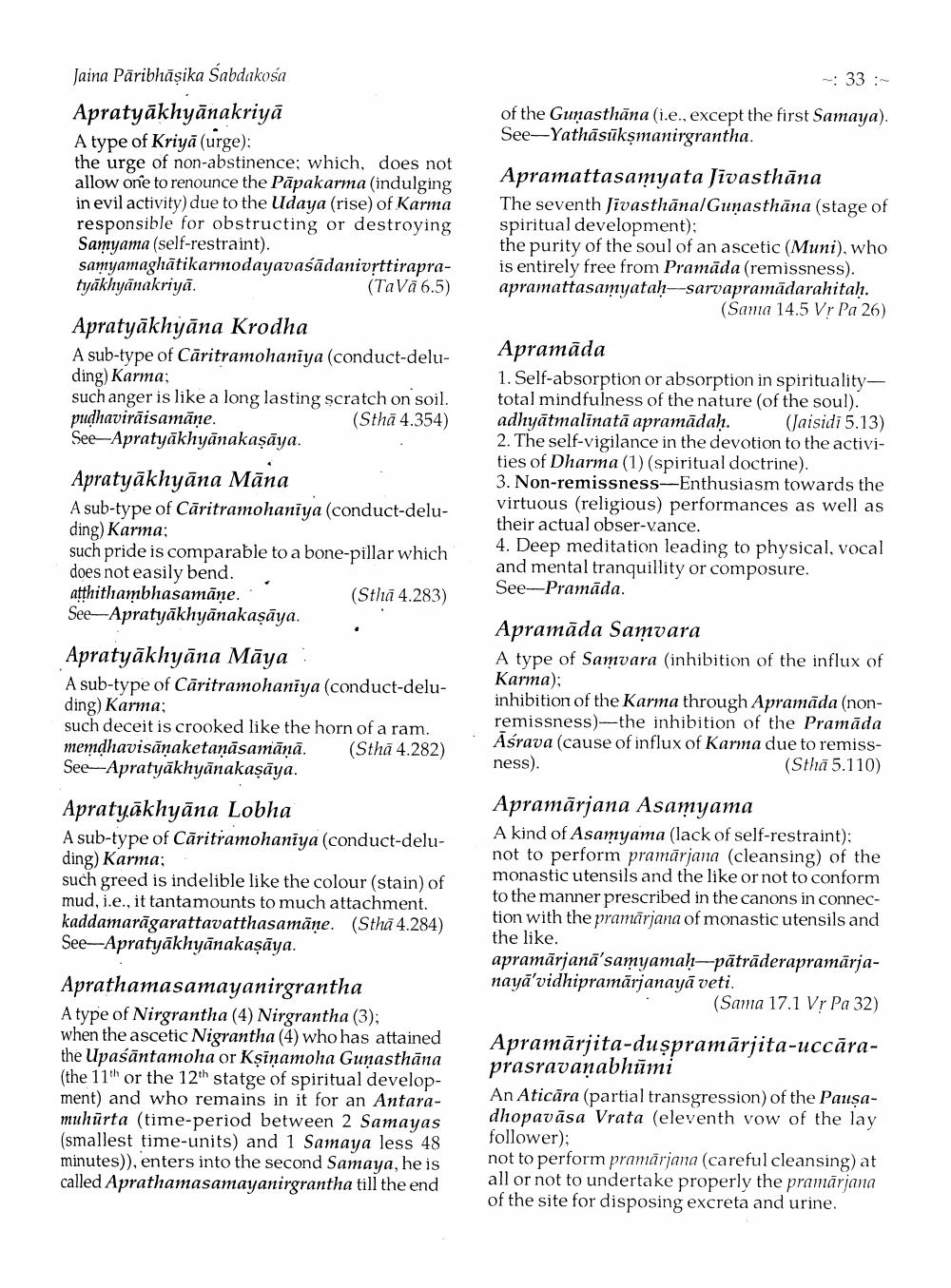________________
Jaina Paribhāṣika Sabdakosa
Apratyakhyānakriyā A type of Kriya (urge):
the urge of non-abstinence; which, does not allow one to renounce the Papakarma (indulging in evil activity) due to the Udaya (rise) of Karma responsible for obstructing or destroying Samyama (self-restraint).
samyamaghatikarmodayavaśādanivṛttirapra
tyáklyánakriya.
Apratyakhyana Krodha
A sub-type of Caritramohaniya (conduct-deluding) Karma:
such anger is like a long lasting scratch on soil. pudhaviraisamāne. (Stha 4.354) See-Apratyäkhyānakaṣāya.
(Tavā 6.5)
Apratyākhyāna Māna
A sub-type of Caritramohaniya (conduct-deluding) Karma:
such pride is comparable to a bone-pillar which does not easily bend. atthithambhasamāņe See-Apratyakhyānakaṣāya.
(Stha 4.283)
Apratyäkhyāna Maya
A sub-type of Caritramohaniya (conduct-deluding) Karma:
such deceit is crooked like the horn of a ram. memdhavisanaketaṇāsamāṇā. (Stha 4.282)
See Apratyakhyānakaṣāya.
Apratyakhyāna Lobha
A sub-type of Caritramohaniya (conduct-deluding) Karma;
such greed is indelible like the colour (stain) of mud, i.e., it tantamounts to much attachment. kaddamaragarattavatthasamane. (Sth 4.284) See-Apratyakhyānakaṣāya.
Aprathamasamayanirgrantha A type of Nirgrantha (4) Nirgrantha (3); when the ascetic Nigrantha (4) who has attained the Upasantamoha or Kşinamoha Gunasthana (the 11th or the 12 statge of spiritual development) and who remains in it for an Antaramuhurta (time-period between 2 Samayas (smallest time-units) and 1 Samaya less 48 minutes)), enters into the second Samaya, he is called Aprathamasamayanirgrantha till the end
: 33:~
of the Gunasthana (ie., except the first Samaya). See-Yathasükṣmanirgrantha.
(stage of
Apramattasamyata Jivasthana The seventh Jivasthana/Gunasthāna spiritual development); the purity of the soul of an ascetic (Muni), who is entirely free from Pramada (remissness). apramattasamyataḥ sarvapramädarahitaḥ. (Sama 14.5 Vr Pa 26)
Apramāda
1. Self-absorption or absorption in spiritualitytotal mindfulness of the nature (of the soul). adhyatmalinata apramädaḥ. (Jaisidi 5.13) 2. The self-vigilance in the devotion to the activities of Dharma (1) (spiritual doctrine).
3. Non-remissness-Enthusiasm towards the virtuous (religious) performances as well as their actual obser-vance.
4. Deep meditation leading to physical, vocal and mental tranquillity or composure. See-Pramada.
Apramāda Samvara
A type of Samvara (inhibition of the influx of Karma);
inhibition of the Karma through Apramada (nonremissness) the inhibition of the Pramada Aśrava (cause of influx of Karma due to remissness). (Stha 5.110)
Apramärjana Asamyama
A kind of Asamyama (lack of self-restraint): not to perform pramarjana (cleansing) of the monastic utensils and the like or not to conform to the manner prescribed in the canons in connection with the pramarjana of monastic utensils and the like.
apramärjana'samyamah-päträderapramärjanaya'vidhipramärjanayā veti.
(Sama 17.1 Vr Pa 32)
Apramarjita-duspramarjita-uccara
prasravanabhumi
An Aticara (partial transgression) of the Pausadhopavasa Vrata (eleventh vow of the lay follower);
not to perform pramarjana (careful cleansing) at all or not to undertake properly the pramarjana of the site for disposing excreta and urine.




